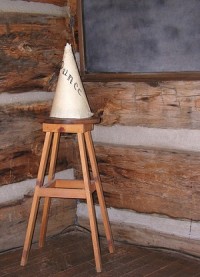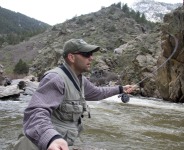Teeg Stouffer fishes blue ribbon waters in Colorado.Photo: Recycled FishTeeg Stouffer is a lifelong fisher with a lot of hooks in his tackle box. Verbal hooks, that is, that challenge his fellow anglers to consider how they can do right by the environment while enjoying their favorite pastime. Based in Nebraska City, Neb., and traveling widely to fishing events, his nonprofit Recycled Fish is greening the average fisher, with the happy effect of improving water quality nationwide. He’s also a host of the popular Fish Shtick podcast, where I first encountered his work.
Q. How many people fish recreationally in the U.S.?
A. According to the American Sportfishing Association, more people fish in America than play golf and tennis combined. Depending on what number you use, that’s between 40 million and 60 million anglers.
Q. Tell me about the S.A.F.E. angling practices you promote.
A. S.A.F.E. angling stands for “Sustaining Angling, Fish, and Ecosystems.” It encompasses the products and practices an angler can use on the water to be a good steward of [fish and ecosystems]. That means using effective catch-and-release tactics, employing selective harvest strategies effectively, [using] non-toxic and biodegradable tackle, and cleaning up after others, to name a few examples. But it’s the stuff we do every day — our lives when we are not on the water — that matter just as much. We encourage anglers to live a “lifestyle of stewardship,” because no matter how good we are at practicing catch and release, our everyday choices matter as much or more.
Q. I just took the Sportsman’s Stewardship Pledge at your site. It is very no-nonsense but also far-reaching in encouraging people to adopt a conservation mindset. How many have signed it, and what has the practical outcome been?
A. Over 13,000 anglers have taken the Sportsman’s Stewardship Pledge from all 50 U.S. states and 20 countries globally. The question is, “Does it matter?” The short answer is yes.
In a survey of people who have taken the Stewardship Pledge — we call them “stewards” — we learned that over 90 percent said that they had learned more about how to be a good steward in the year following taking the pledge. In other words, once a person pledges to be a steward of their waters, their eyes are opened to their own actions, and their own sense of personal responsibility is invoked.
More exciting is this statistic: 65 percent say they actually changed the way they live.
Q. Recycled Fish is an environmentally minded organization, but you avoid using words like climate, eco, and green with fellow anglers. Why do words like stewardship, caretaker, protect, and conserve work better?
A. Everything regarding the environment has been politicized. As soon as you mention “green” anything, the conversation is colored by association with the political left. Many anglers identify themselves with the political right, so terms like global warming, environmentalist, and eco-friendly disengage them. They immediately dismiss it. That’s the opposite effect that we want to have — we want to engage them, and activate their passion for our waters.
Anglers tend to have an independent spirit, and individualism is a highly regarded value. Themes like being a “protector” resonate with them. “Caretaker” isn’t a politicized term, and we tend to use the term “steward” a lot because it invokes both spiritual values and a personal responsibility, which is exactly what we’re all about.
The truth is, whether you believe that climate change is occurring or not, the strategies and tactics that prevent carbon emissions and greenhouse gases are the same ones that will help our waters. All we have to say is, “If you care about catching more and bigger fish and you want to leave something great for your grandkids, turn off the lights when you leave the room.” That line of reasoning makes perfect sense to an angler. Our lifestyle runs downstream, so everyday choices affect our waters. When we say stuff like, “Clean up after your dog if you want to catch more and bigger fish,” it gets the attention of anglers. It’s logical.
Kids play a game to learn about taking care of our waters at this year’s Bassmaster Classic.Photo: Recycled Fish
Q. What mainstream events and partners do you have?
A. Recycled Fish has been a part of the Bassmaster Classic — often referred to as “The Superbowl of Fishing” — for the past four years, thanks to Dick’s Sporting Goods, who are the presenting sponsors for the classic expo. They have afforded us space to present the Stewardship Ethic at the expo, and we always have interactive games to teach kids how to be stewards of our waters. We also turn up at fishing industry events like ICAST, and appear across the country at retail events like the Bass Pro Shops Spring Classic or Dick’s Sporting Goods grand openings.
Our “Recycled Fish On Ice” tour takes us to over 60 of the biggest events in ice fishing, and we’re proud to be the conservation partner to the St. Paul Ice Fishing & Winter Sports Expo, which is the unofficial kickoff event for the ice fishing season each winter. Recycled Fish is the nonprofit conservation partner to the Professional Anglers Association, a professional bass fishing association.
Q. What do you see as the biggest environmental threat to fishing?
A. Without a doubt, water quality is huge. The fishing industry has responded to two main issues in recent years: recruiting and retaining anglers, and also access issues. Those are big, but the looming giant is water quality. Endocrine disruption in fish is well-documented, but still little understood by the angling public and the fishing industry. The EPA recently found both male and female reproductive organs in individual freshwater fish everywhere they looked except Alaska. That wasn’t the case 30 or 40 years ago. It’s not great news. Fish are a canary in the coal mine for us — after all, we drink that water too.
The causes are not yet scientifically proven, but likely causes include the downstream effects of a highly medicated human population and our inability to fully remove these medications through our aging sanitary sewer systems, as well as the effects of the chemical load on our waters, [from] soaps and detergents to surfactants. Endocrine disruption and reproductive abnormalities mean more than the potential for collapsing fish populations, they’re an indication of what’s coming for us.
Fishing is one of the best ways to get kids interested in the outdoors.Photo: Recycled Fish
Q. How does the “take a kid fishing” campaign he
lp the conservation movement?
A. What’s good for our waters is good for our culture. In his book Last Child in the Woods, Richard Louv established that kids who get unstructured time in the outdoors do better in school and have better social skills and lower rates of ADD / ADHD. So another organization, the Outdoor Foundation, did a study that asked, “How do we get kids interested in the outdoors?” Fishing ranked No. 1. That’s higher than other more accessible, easier to do activities like hiking or riding bikes. I suppose it’s because fishing provides that tangible connection and real interaction with nature.
The point is — if you want your kids to do well in school, take ’em fishing.
And our waters need anglers. Conservation by participation is the name of the game. The primary funding source for conservation and the management of our waters comes from license sales and a special excise tax on fishing gear. Every fishing rod, tackle box, or boat sold in America delivers dollars straight to our waters.
Finally, if people aren’t engaged with our waters, they aren’t motivated to be caretakers of them. That means that from the political decisions about managing our waters to the way we live — our everyday choices — we need people who are experiencing our environment firsthand if we want to have a healthy place to live a few generations from now.
Q. What successes can Recycled Fish claim in the last five years?
A. We are proud of the results of the Stewardship Pledge. However, it’s also been said of us that we’ve shifted the culture of ice fishing. Before our “Recycled Fish On Ice” tour, ice fishing was essentially a kill sport. Large events — some with over 10,000 people — killed a lot of fish and generated a lot of trash on the ice as well, and the norm was to have event organizers or a Boy Scout troop do a cleanup afterward.
Teeg gets a moment to fish during the “Recycled Fish on Ice” tour.Photo: Recycled Fish
Today, catch and release and selective harvest are normal terms in ice fishing. We show up at events and give everyone a heavy duty clear plastic bag. They fill it with water, and transport their fish to weigh-in stations alive, and the fish are released alive after being weighed. Fish that can’t be released are utilized for raptor recovery efforts or cleaned and become food for the less fortunate.
At the end of the events, every person is encouraged to use their bag to clean up any trash they see, and that has powerful ripple effects. Sure, the lake is left clean, but it also instills the mindset that we don’t wait for someone else to come clean up after us — each of us is a steward of our waters and the area around us.
Q. Doesn’t catch and release still kill fish, though?
A. No matter how diligent we are, fishing is a blood sport. Some fish die. But if we use the best practices like those on the Recycled Fish website, mortality rates are around 4 percent. Historically, people practiced “catch all you can, and can all you catch.” That led to mortality rates of 100 percent. Part of fisheries management today involves catch-and-release fishing, and we support selective harvest. Fish are delicious and healthy; they are a renewable resource, and part of the heritage of our sport is bringing fish to the table. However, if we want strong fisheries, we have to harvest selectively.
Q. How are you funded?
A. As a 501(c)3 nonprofit organization, we count on people who care about our waters to chip in. One of our most important sources of funding is private, individual donations. Anyone can take the Sportsman’s Stewardship Pledge for free. We want no barrier to someone identifying themselves as a steward of our waters. However, we rely on people to become Supporting Stewards by making a $25 donation. It’s a no-brainer, if you ask me. We send a Stewardship Kit that’s loaded with stuff, including a Recycled Fish T-shirt, for that gift.
We also get support through corporate sponsorships, grants, and fundraisers. You can see a complete list of our partners on our website.
Q. How does the 24 Hour Fish-A-Thon help your mission?
A. We are in our third year for the 24 Hour Fish-A-Thon, and it looks like it will be our biggest year so far. Anglers fish around the country and around the clock to raise awareness for the problems facing our fisheries, and money to help solve those problems through education. Not only that — it’s fun! It’s kind of like the fishing version of running a marathon, and anglers love fish stories. This produces them. Plus, anglers win all kinds of prizes, including fishing trips of a lifetime. This year we’ll give away a trip to the Mississippi Delta with Griffin Fishing Charters, and either a trip to Spring Bay Resort in Minnesota or Fish Tales Outfitters in Montana.
Q. What are the toughest hurdles you see for your mission getting out further?
A. Without a doubt, funding is one of our greatest obstacles. Our growth on the program/mission side has greatly outpaced our growth on the financial side, which is unsustainable. We’ve made some changes and are continuing to adapt our approach to be sustainable, but funds need to come, and soon.
The other challenge is that there are so many other organizations that can say, “Help us join the fight against ‘insert evil here.'” For example, “Cancer is bad, join the American Cancer Society in fighting cancer.” Or, “Child poverty is bad, join Compassion International in fighting child poverty.” There is a clear evil and a person gets to be a hero by fighting that evil.
When it comes to our waters, that evil is us. So the best we can do is say, “You can be one of the good guys, or one of the bad guys — which will you be?”
People resist change, and anglers tend to be a group of people who can be especially slow to change, which means that we have our work cut out for us in shifting this culture. But the payoff is huge, and we’re making progress, so that’s the motivation to keep going.
Volunteers help with restoration work at Carter Lake, Iowa.Photo: Recycled Fish
Q. What accomplishments do you anticipate in the next 10 years?
A. If you buy a spool of fishing line today, no matter who the manufacturer is, you can be pretty sure there will be a knot guide in there. It’s a little information card that teaches you how to tie knots. Within the next 10 years, I believe that half of the fishing products on the market will come with some sort of information that talks to anglers about being stewards of their waters. That’s a charge we’re leading right now.
We’re also piloting a program right now that will put a shoreline cleanup bag in 1 million anglers’ hands. Packaged with it is a booklet that talks about choices we can make every day to help our waters be cleaner and healthier. Ten years from now we will have distributed at least our first million. I’d love to say that
we’ll be up to 2 million by then. The message is that we don’t do the occasional lake, stream, or beach cleanup. We are lake, stream, or beach cleanups — every time we’re on the water, our waters are better off because of us.
Q. So you really think fishers can be significant agents of change.
A. There exists a perception among some that anglers are drunk rednecks. A more politically correct way to say that would be “wasteful, consumption-oriented people.” That’s not accurate. Statistically speaking, no group of people puts more time or money into conservation than anglers. Demographically speaking, anglers span the geographic, political, racial, and socioeconomic spectrum. We are a diverse group with a tangible connection to our waters, and a passion for both healthy waters and leaving something great for future generations.
Recycled Fish is doing something that no other group is. There are other angling-oriented conservation groups, but they focus on either a specific species (BASS Conservation Team, Trout Unlimited, Muskies Inc.), or a specific watershed. There are other good organizations doing important work for our waters and wild places, and the list is long, but they don’t specifically engage anglers.
We’re the only group that engages anglers for everyday stewardship of our whole environment. We’re the only group taking a holistic view of our waters and the problems facing them, and activating this huge group of people — anglers — as a way to help solve those problems.
There’s nobody we tell about our mission who doesn’t say, “That’s great!”
What we’re counting on is more people who say, “That’s great, I’ll help.”



